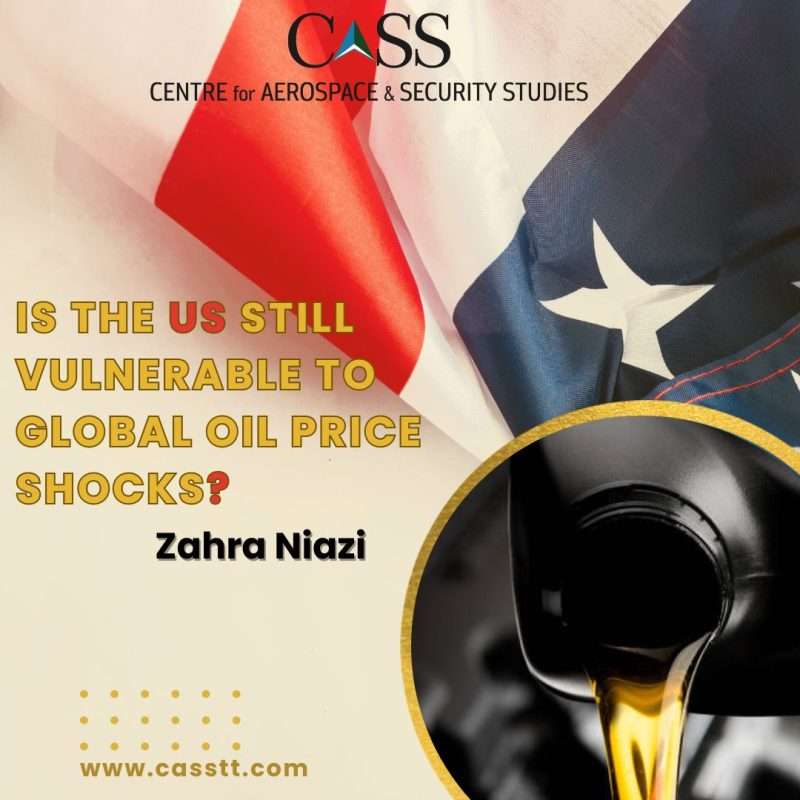On 19th October, 1973, immediately following the Nixon administration’s affirmation of a USD 2.2 billion military aid package to Israel in the aftermath of the Yom Kippur War, the Arab states responded by imposing an oil embargo on nations supportive of Israel. The resultant oil price shock was so grave that in the United States, gasoline prices increased by up to 40 percent in a matter of months, leading to rationing of fuel resources, the formation of hours-long lines at gas stations across the country, and polarisation of politics at home. This forced a major shift in the US energy policy, including increasing domestic oil production and establishing a Strategic Petroleum Reserve (SPR). Thus, almost five decades later, US administration officials and some analysts claim that the country remains less vulnerable to an oil price spike today and can counteract a disruption in oil markets should it occur resulting from the wider regional escalation of Israel’s recent war in Gaza. However, circumstances on the ground suggest that the claims of US energy independence may be exaggerated.
At the time of this writing, the war has inflicted limited damage on the global oil market. Brent crude oil prices have majorly been hovering between USD 87 and USD 90 per barrel (/bbl) after the onset of the conflict on 7th October, compared to USD 84.58/bbl on 6th October. Neither Israel nor besieged Gaza are significant oil producers, and any regional involvement has, thus far, not affected Middle Eastern oil supplies. However, the spectre of regional escalation and the subsequent likelihood of global oil price shock looms large as tensions within the Middle East grow. According to the World Bank, a ‘small disruption’ in oil supplies caused by the war, roughly equivalent to the disruption seen during the 2011 Libyan Civil War, can take oil prices to a range of USD 93 to USD102/bbl; a ‘medium disruption’ in oil supplies, comparable to the reduction seen during the 2003 Iraq war, can increase oil prices to between USD 109 and USD 121/bbl; and a ‘large disruption’ in supplies, similar to the disruption caused by the 1973 Arab oil embargo, can elevate prices to a range of USD 140 to USD 157/bbl. The disruption in oil supplies can stem from factors, including inter alia, the shutdown of oil facilities or oil pipeline disruptions; heightened security risks for maritime transportation through three major shipping choke points, including the Strait of Hormuz, Bab el Mandeb, and Suez Canal; or in the worst case, the blockade of the Strait of Hormuz, responsible for the transit of 30% of the world’s seaborne oil shipments; and oil export cuts against selected states.
In the period preceding the war, the US helped ease the global oil prices resulting from the Russian invasion of Ukraine in 2022 and later the oil output cuts by Saudi Arabia and some other OPEC+ nations by tapping the SPR. Nevertheless, Washington’s influence on global oil prices is now waning, as the SPR stands at a 40-year low due to the record drawdowns last year. To put this into perspective, the reserve holds 351 million barrels of crude petroleum today, and in 2022, the daily petroleum consumption in the US averaged 20.01 million.
Moreover, despite being the world’s top crude oil producer, the US remained the net importer of crude oil in 2022. A major reason it depends on imported oil is that several states within the country lack the infrastructure to produce, refine, or transport oil and rely on imports and expensive transportation modes to fulfil fuel demand. Also, a significant proportion of the country produces sweet and light oil, while its refining capacity is ‘geared towards dealing with oil that is heavier and less sweet’. Crude oil is the major input cost for gasoline production in the US, and estimates show the ‘international spot crude oil prices represented by Brent’, rather than the ‘domestic spot crude oil prices represented by the West Texas Intermediate (WTI)’, is a more important predictor of gasoline prices in the US. In other words, the latter tends to move with Brent rather than the WTI, which represents the oil produced in the US.
Oil price hikes also lead to a spillover effect on the end prices of multiple services and consumer goods by increasing production and transportation costs. According to the World Bank, a sustained increase in oil price spike due to an escalation of the Middle Eastern crisis could increase the production and transportation costs for fertilisers and food, thus raising global food prices.
What the US administration is lacking, or at least appears to be lacking, is strategic foresight to realise the repercussions of its support of Israel’s genocidal aggression in Gaza. A global oil crisis, should it occur, would amplify domestic anger and make it harder for Biden to keep domestic inflation low as he campaigns for re-election. The American electorate will then remember him not only for his immoral actions but also as the leader who failed to fulfil the social contract with its population.
Zahra Niazi is a Research Assistant at the Centre for Aerospace & Security Studies (CASS), Islamabad, Pakistan. The article was first published in the News International. She can be reached at cass.thinkers@casstt.com.
Design Credit: Mysha Dua Salman




